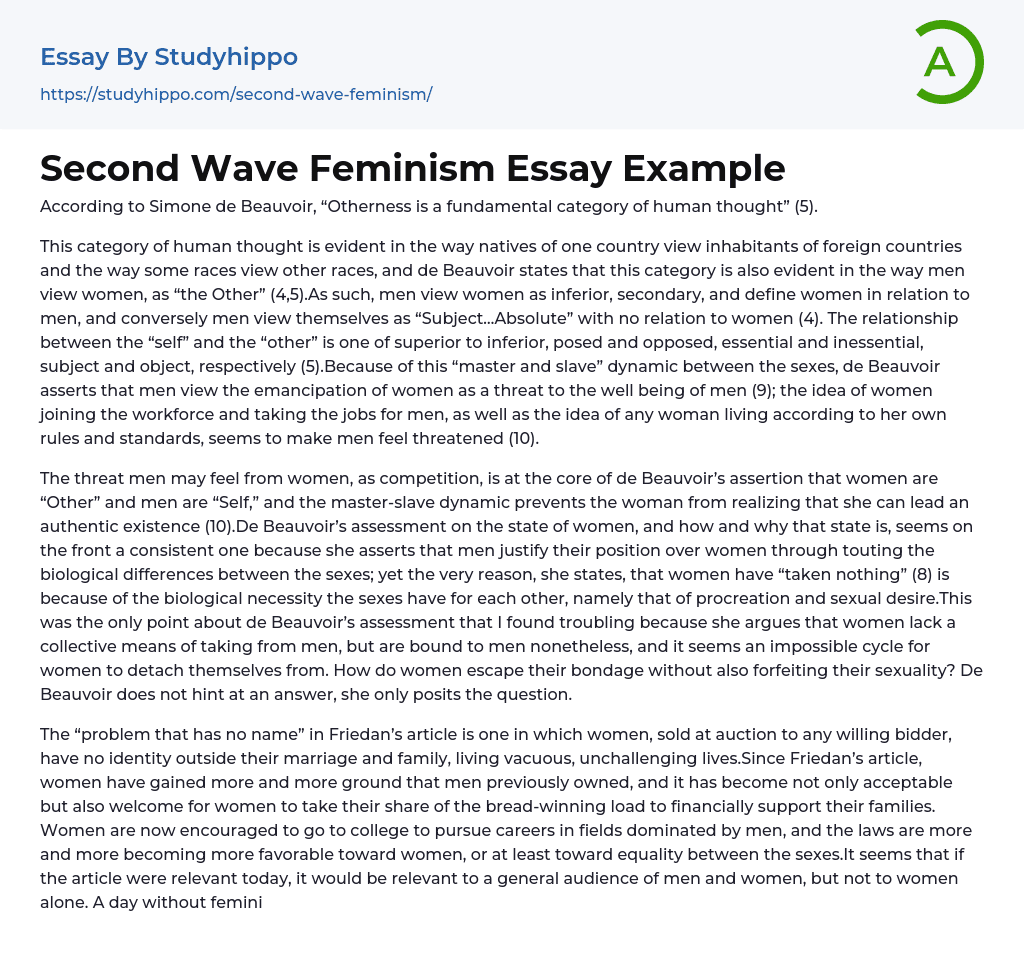Simone de Beauvoir affirms that Otherness is a primary concept in human thinking, as stated by her quote: "Otherness is a fundamental category of human thought
" (5).
According to de Beauvoir, the category of human thought that perceives individuals from different countries or races as inferior to oneself is also applied by men in relation to women, whom they view as "the Other" (4, 5). Women are defined by men as secondary and inferior, with their identities determined by their relationship to men. Conversely, men view themselves as "Subject…Absolute," without any connection to women (4). This relationship between self and other is one of superiority and inferiority, posed and opposed, essential and inessential, subject and object (5). Due to this "master and slave" dynamic between genders, de Beauvoir argues that men perceive the empowerment
...of women as a threat to their own wellbeing (9). The idea of women entering the workforce and taking jobs traditionally filled by men and the notion of women living by their own standards appear to make men feel threatened (10).
According to de Beauvoir, women are seen as the "Other" and men as the "Self" due to men feeling threatened by women as competition, which creates a master-slave dynamic that prevents women from leading an authentic existence (10). She argues that although men use biological differences to justify their position over women, the reason women have not achieved anything is because of the biological necessity for procreation and sexual desire (8). However, de Beauvoir's assessment is troubling because she states that women are bound to men without a means of taking from them collectively, making it difficult for women to escape their
bondage without forfeiting their sexuality. She raises the question but does not provide an answer.
Friedan's article identified the "problem that has no name," where women were devoid of identity beyond marriage and family and lived lackluster lives as auctioned commodities. Over time, women have gained equal footing with men and are encouraged to support their families financially and pursue male-dominated careers by attending college. Laws have become more favorable toward gender equality. Today, Friedan's article would be relevant to all, not just women, as a world without feminism would be outdated and tedious.
Feminism aimed not only for the advancement of women but also for men. Male fashion designers and interior decorators emerged as evidence of the benefits that men have gained from feminist movements. To imagine a day without feminism is to embrace narrow-mindedness, similar to believing that the earth was once flat or at the center of the universe. The progress we've made in understanding gender and sexuality makes such thinking obsolete. A day without feminism instills fear like wetting oneself in front of others; it's memorable and regrettable.
- Women's Suffrage essays
- Women'S Rights essays
- Women Empowerment essays
- Sojourner Truth essays
- Abortion essays
- Abuse essays
- Animal Rights essays
- Animal Testing essays
- Assault essays
- Bullying essays
- Controversial Issue essays
- Crash essays
- Cyber Bullying essays
- Feminism essays
- Human Rights essays
- Immigration essays
- Inequality essays
- Poverty essays
- Prejudice essays
- Racism essays
- Torture essays
- Violence essays
- Equality essays
- Gender equality essays
- Gender Inequality essays
- Minority essays
- Segregation essays
- Social Inequality essays
- Boy essays
- Gay essays
- Gender essays
- Gender Identity essays
- Gender Roles In Society essays
- Gender Stereotypes essays
- Girl essays
- Homosexuality essays
- Human Sexual Behavior essays
- Lgbt essays
- Man essays
- Masculinity essays
- Sexual Orientation essays
- Transgender essays
- Woman essays




